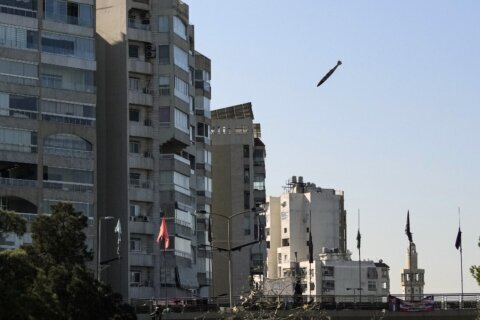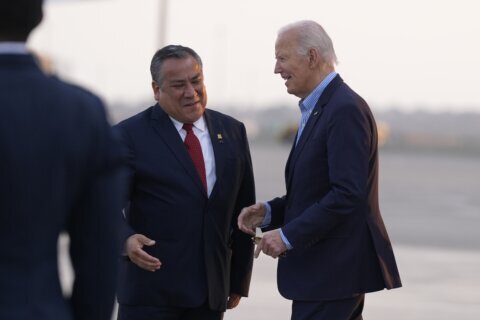TEGUCIGALPA, Honduras (AP) — An incriminating admission by the brother-in-law of Honduras’ president just days after the country announced it would end its longstanding extradition treaty with the U.S. is feeding fears among Hondurans that the country’s legacy of corruption is continuing.
President Xiomara Castro had inspired hope when she was elected the Central American nation’s first female leader in 2021 on a promise to “pull Honduras out of the abyss we have been buried in by neoliberalism, a narco-dictator and corruption.”
Despite being married to former President Manuel Zelaya Rosales – ousted in a coup in 2009 – she was a breath of fresh air for many Hondurans after the presidency of Juan Orlando Hernández, who in June was sentenced to 45 years in prison by a U.S. federal court for drug trafficking.
But as gang violence has continued to roil Honduras and several scandals have plagued Castro’s government, frustration has replaced that initial optimism for many Hondurans who now see her as the same brand of corrupt leader that has long ruled their country.
“We thought that corruption would end with Xiomara Castro, because they were supposed to be different from previous governments, but they have turned out to be the same or worse,” said 44-year-old Gabriel Hernández, who works in marketing in the capital, Tegucigalpa.
The latest blow came this weekend, when Castro’s brother-in-law, Carlos Zelaya, part of Libre’s leadership team in the Congress, admitted that he had met with a leader of the drug trafficking organization “Los Cachiros” in 2013.
Zelaya, brother of the former president, revealed the details to the press when he went to the Public Prosecutor’s Office on Saturday to give a statement related to an investigation into his alleged links to drug trafficking.
He said the drug trafficker offered support to Libre’s campaign that year, when Castro made a failed first bid for the presidency. Zelaya explained that at the time, he did not know that people in the meeting were linked with drug trafficking.
“Eleven years ago I was invited to participate in a meeting in which there was a group of businessmen who wanted to make a contribution to the campaign,” Zelaya said as he left the Public Prosecutor’s Office. “I am convinced that that meeting and everything that happened there was recorded. I fell into a trap, I assume my responsibility.”
His admission came just days after Castro’s foreign affairs minister announced Honduras was ending an extradition treaty with the United States following a spat with an American diplomat. The treaty had been in place for over a century and since 2014, 64 Hondurans have been extradited to the U.S., largely on drug trafficking charges. Among those was former president Hernández.
“I don’t think this is a coincidence, I don’t think it’s random … This is an issue that could be a turning point in Castro’s presidency,” Breda said. “Unless Castro steps back and reestablishes the extradition treaty, this move will inevitably be seen as a way to protect their family.”
Those suspicions were shared by Hondurans like Hernández, the marketing worker, who said that even an “ordinary person like me” knows that it was not a coincidence.
The discontent may be a major political burden for Castro and her Liberty and Refoundation Party (Libre) in the lead up to next year’s elections, said Tiziano Breda, a is a Latin America expert at the conflict analysis organization ACLED. The recent moves by the government “weaken the argument that brought Libre to power, which was basically to kick out the corrupt elite that was in cahoots with drug trafficking organizations,” he said.
The frustrations among Hondurans coincide with sliding approval numbers for the president. Compounding that discontent is also unemployment, economic turmoil and failures to reduce the level of violence.
“It’s common for politicians to play these kinds of games, looking for ways to escape justice, not be accountable to the people, to hide their misdeeds and thus continue their legacy of corruption, which ultimately never ends,” marketer Hernández said.
It’s not the first time Castro has faced criticism for perceived corruption.
Last year, the director of a Honduran anti-corruption organization fled the country with her family over threats she received after publishing a report on nepotism in the Castro administration. The organization had warned of a “concentration of power” from government posts going to the children and other relatives of Castro and her husband, the former president.
Carlos Zelaya’s announcement was followed by another from his son, Honduras Defense Minister José Manuel Zelaya Rosales, who tendered his resignation in an effort to ensure no favoritism would be shown to his father.
On Sunday, Castro announced that Zelaya Rosales, her nephew, would be replaced as defense minister by presidential hopeful Rixi Moncada Godoy.
Moncada Godoy will “raise our flag high and remind us that our true value lies in dignified, strong and determined people who forge their own destinies,” Castro said.
——
Janetsky reported from Mexico City.
Copyright © 2024 The Associated Press. All rights reserved. This material may not be published, broadcast, written or redistributed.







